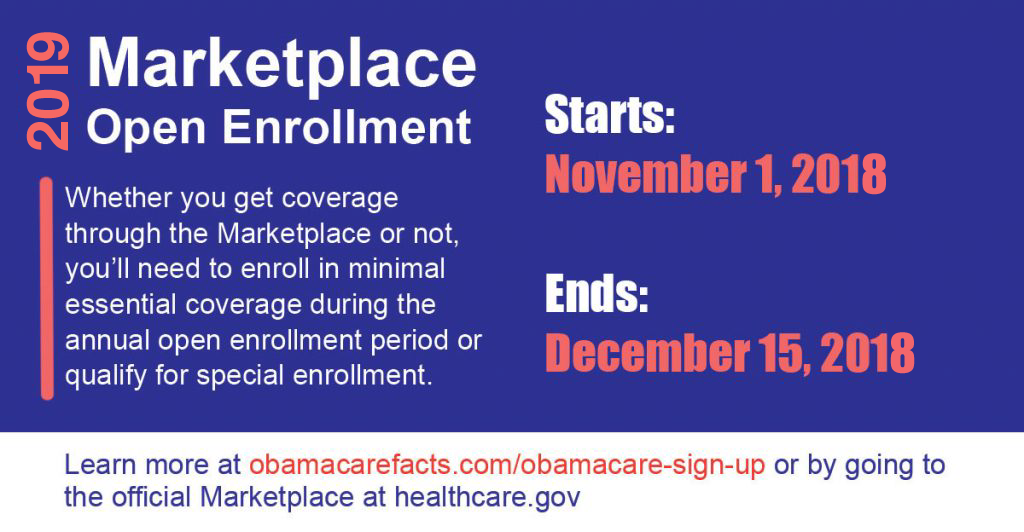Open Enrollment 2019 Dates and Deadlines








Dates and Deadlines For the 2018 – 2019 Open Enrollment Season Under the Affordable Care Act (ObamaCare)
Open Enrollment in health plans for 2019 starts November 1, 2018 and ends December 15, 2018. Plans sold during Open Enrollment start January 1, 2019. Get covered at Healthcare.Gov.[1]
Open enrollment is the only time of year you can enroll in a health plan, switch plans, or re-enroll in your current plan the in individual and family market. If you miss open enrollment, your only options are limited to special enrollment, short term health insurance, employer-based coverage, Medicare, Medicaid, and CHIP.
UPDATE: Open enrollment for 2020 health plans started Nov 1 2019. Get dates and deadlines for 2020.
Key Dates For Open Enrollment 2019 (the 2018 – 2019 Open Enrollment Season For Plans Held in 2019)
- November 1, 2018. Open Enrollment begins.
- December 15, 2018: Open Enrollment ends (extensions may be granted).
- January 1, 2019: The earliest a plan purchased during open enrollment can start.
NOTE: Enrollment dates are subject to change each year. The federal government and/or some or all states may extend enrollment. We will post extensions below if and when any are announced.
State Specific Deadlines and Extensions
Some states have state specific deadlines.
- California: January 15, 2019
- Massachusetts: January 23, 2019
- Minnesota: January 13th, 2019
- Rhode Island: December 31st, 2018
- Washington DC: January 15th, 2019
Other states are subject to extension as well. Look for extensions for Colorado, Connecticut, Flordia, Maryland, and New York.
Key Facts About Open Enrollment 2019
- If you want to keep it simple, you can sign up at the official health insurance marketplace HealthCare.Gov and find out if you qualify for cost assistance now (those who live in states who use state-based exchanges will be redirected to the proper site).
- Open enrollment is the only time you can shop for health plans in the individual and family market without qualifying for special enrollment.
- To qualify for special enrollment you must have a Qualify Life Event (QLE) such as losing employer-based coverage.
- If you want to enroll, re-enroll, or change plans for 2019 you must do it during open enrollment.
- Comprehensive health coverage that offers the benefits and protections of the Affordable Care Act can only be sold during open enrollment or during special enrollment.
- Only plans sold on the health insurance marketplace qualify for cost assistance in 2019 (NOTE: a private broker can help you choose a marketplace plan).
- If you miss open enrollment, your only options are Short Term Health Insurance, employer-based coverage, Medicare, Medicaid, and CHIP. Any or all of those may not be a an option for some, as all generally have additional requirements for eligibility.
- If you don’t enroll in a plan during open enrollment, you won’t owe the fee for 2019 forward due to the mandate to get coverage being repealed at a federal level (some states have state-based mandates), but you will likely miss you opportunity to get guaranteed issue comprehensive coverage in the individual and family market.
- Medicare has a unique open enrollment period as do other types of health insurance sold outside the private individual and family market. If you qualify for Medicare, you don’t have to worry about ObamaCare for yourself (although you are still responsible for ensuring your tax family gets covered if you are the head-of-household). Learn more about ObamaCare and Medicare.
You can learn all about open enrollment here. Learn more about what to do if you miss the deadline here. See our main ObamaCareFacts page for more details.
Additional Advice About Open Enrollment 2019
Below are a few additional points to consider.
- In the past open enrollment in the federal marketplace HealthCare.Gov has been extended. Despite this, one should never count on extensions. We advise shopping early to avoid missing the official deadline. If things change, we’ll make sure to keep you updated.
- If you qualify for cost assistance, think carefully about how much you take up front in Advanced Premium Tax Credits. Cost assistance is based on household income and family size as compared to the Federal Poverty Level. If you project your income inaccurately, you may end up owing back tax credits on form 8962 at tax time. This is especially true if you or a tax filer in your household gains or loses income. Medicaid and out-of-pocket assistance don’t require repayment.
- We advise those looking for coverage to shop on their state’s official marketplace or HealthCare.gov (in states that use the federal marketplace). This will ensure shoppers know all their options regarding cost assistance and get a major medical plan that counts as minimum essential coverage. Shoppers can also contact an online or in-person broker (like the ones featured on our site) for help selecting a marketplace health plan or off-marketplace plan. In some cases, shoppers can also go directly to an insurer although this may require going directly to an insurer’s office, as insurers are encouraging shoppers to use the exchange. Learn more about shopping for private health plans outside the marketplace.
- See also maximums and deductibles and HSA info for plans. An HSA is an excellent way to save tax dollars for those who have enough money to fund them.
BOTTOM LINE: Start your journey at HealthCare.gov. Make sure you are not only signed up but enrolled in a plan by December 15th, 2018. This is the deadline for all states if you want coverage that starts by Jan 1st, 2019. We suggest paying careful attention to cost sharing and networks when shopping for a plan. When in doubt, a Silver Plan that qualifies for an HSA is typically a safe bet. Get more tips for shopping for getting the best health plan.
- Dates and deadlines for 2018 & 2019 health insurance. HealthCare.Gov.